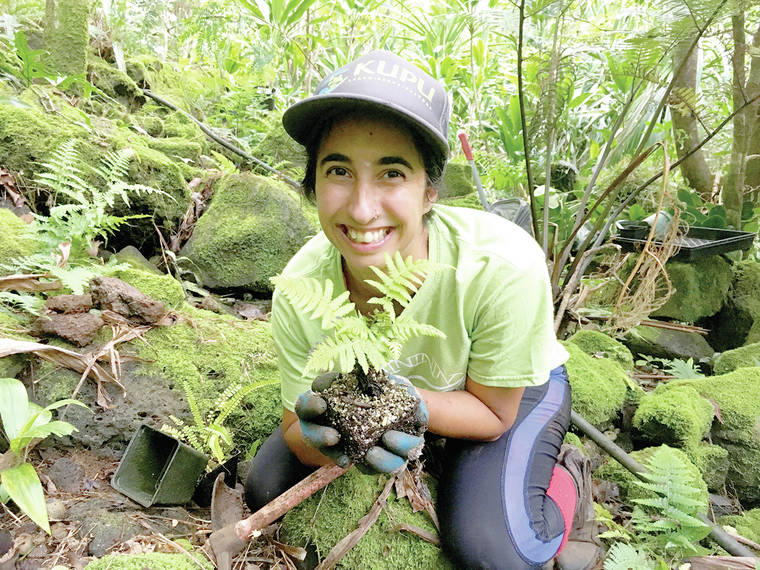Limahuli flood recovery is talk topic
HAENA — Limahuli Garden and Preserve took a beating last year when the historic “rain bomb” exploded in April 2018. The catastrophic event took a particular toll on the North Shore, damaging landscapes and wreaking havoc on the environment and people’s lives.
The National Tropical Botanical Garden is presenting a free public lecture that will detail how its North Shore site was affected by the devastating flood and its long road to recovery.
It will be a “virtual trip through the valley from mauka to makai,” said Dr. Uma Nagendra, conservation operations manager and ecologist at Limahuli Garden and Preserve.
Nagendra will host a talk, called “After the Flood: Building Resilience in Limahuli Valley,” on Tuesday.
She will discuss the “sudden and dramatic” changes that caused challenges for the garden, including drastic alterations to areas where the water’s sheer force carved out new ravines.
There will be before and after pictures, and the audience will get to understand exactly how much damage landslides inflicted upon the Limahuli’s lower preserve, as well as the “iconic” stream’s overlook site, Nagendra said.
Like a phoenix rising from the ashes, however, the Limahuli Garden and Preserve was revitalized by volunteers and employees who came together to restore the valley and welcome guests again earlier this year.
Noticeable recovery efforts include the rehabilitation and re-design of the stream for resiliency against large floods, Nagendra said.
“To me, it is also a subtle but touching tribute to the event itself,” she said.
Besides the scenery, another aspect that’s been altered at Limahuli Garden and Preserve is the way in which tourism is approached.
“The flood and ongoing recovery are now a part of the story the garden tells and shows— and we want visitors to know how they can also be a part of the solution to protect the area,” Nagendra said.
Besides successful rehabilitation efforts, scientists are also grateful that the accessible rare plants they’ve checked on made it through the storm.
“Much of this is thanks to the limited impact on the highly diverse, relatively intact forest in the Upper Limahuli Preserve,” Nagendra said.
Despite this positive fact, recovery efforts are still ongoing. Conservationists at Limahuli are still actively restoring the damage caused by landslides through efforts, such as removing invasive shrubs and trees before they are rooted in “newly available land,” promoting the growth of existing and new native plants, and increasing the population of native ‘o‘opu fish (gobies) in the stream.
“Uma’s talk at KCC is a good opportunity to hear directly from someone who experienced an extreme weather event on Kauai and the aftermath, as she shares her story and thoughts on impacts of the climate crisis and how Kauai can and needs to be more resilient in the face of climate change,” said Jon Letman of NTBG’s Publications Office. “When something like the ‘rain bomb’ hits, it’s a wake-up call for a lot of people who never thought about how they could be directly affected by climate change.”
Nagendra has worked as a conservation operations manager and ecologist at NTBG for the past two years. She is responsible for funding and organizing biocultural conservation projects within the 1,000-acre Limahuli Preserve.
Katie Champlin, interim director of Limahuli Garden and Preserve, will join Nagendra for the talk, which starts at 5:30 p.m. on Tuesday at Kauai Community College’s Campus Center Cafeteria (behind the Performing Arts Center).
•••
Coco Zickos, county reporter, can be reached at 245-0424 or czickos@thegardenisland.com.

